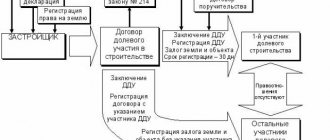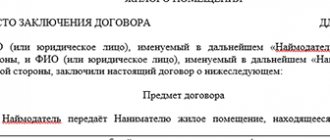Home / Apartment / Social tenancy agreement
The concept of social rental of residential premises was introduced by the Civil and Housing Codes to streamline legal relations in the field of operation of municipal and state housing funds.
Under a social tenancy agreement, the landlord, that is, the owner of an apartment or other housing belonging to a state or municipal fund, or his representative (authorized person), undertakes the obligation to transfer this residential premises to the citizen tenant for possession and use for the purpose of living in it under certain conditions prescribed in Russian housing legislation.
After the Housing Code came into force in 2005, the need to conclude an agreement for the social rental of apartments raised many questions among citizens living in residential premises of a municipal or state housing stock.
However, as practice has shown, a social rental agreement is only a formal document that states the right of the tenant and other members of his family to use an apartment or other housing without a time limit.
The agreement simply streamlined the existing relationship between the relevant municipality (state) and the owner of the apartment. In addition, the agreement stipulates the rights and obligations of the tenant using the premises for social rent.
However, one should not equate the relationship of social hiring with the implementation of privatization. In the latter case, the apartment is considered the property of the citizen, and with social rent it remains the property of the municipality, despite almost the same conditions of use.
Main characteristics of social hiring
The social rental agreement for residential real estate is characterized by the following features:
- residential premises under this agreement are provided from state or municipal housing funds;
- the agreement is indefinite, which distinguishes social rental from legal relations for the rental of service apartments;
- the contract is consensual, that is, to formalize it, the parties only need to agree on the essential terms of the agreement, namely the subject (that is, a specific residential premises) and the identity of the tenant;
- The social rental agreement is compensated, since housing is provided to the tenant for a certain fee.
Form of residential lease agreement - sample agreement, registration and terms
The owner of residential premises has the legal right to rent it out on the basis of a lease agreement to individual citizens or a lease agreement to legal entities. Tenant rights include ownership and use of residential premises, that is, the right to live in it. The state can also provide housing, but in this case a social tenancy agreement is drawn up.
Can be rented:
- private residential building,
- apartment,
- part of a house or apartment.
The basic requirements for housing for renting in accordance with the Civil and Housing Codes of the Russian Federation include:
- it must be located in a residential building;
- the living space must have direct access to the street, i.e. to be isolated;
- the premises must be suitable for permanent residence, i.e. comply with the rules and regulations established by law;
- The property being rented out must initially be intended only for living in it.
According to Art. 674 of the Civil Code of the Russian Federation, an agreement on the rental of housing must be concluded in writing.
This article focuses on the main issues and problems associated with correctly filling out a residential lease agreement.
Residential rental agreement
This is a document according to which the owner of the property transfers residential premises to the tenant for a certain time and for an agreed fee. It protects the interests of all its participants: the landlord can demand from the tenant the fulfillment of stipulated obligations legally, just as the tenant does from the owner.
The agreement is drawn up in free form, but its participants can refer to the sample document approved by Government Decree No. 315 of May 21, 2005. This sample sets out the rights and obligations of the parties quite specifically and completely.
The essential terms of the employment agreement include:
- Rental object.
- Parties to the agreement.
- Rent amount and payment procedure.
- The period for which housing is provided.
- Signatures of the parties.
The agreement also necessarily stipulates the rights and obligations of its participants.
However, each situation has its own subtleties and small details; they should be thought through and included in the contract being drawn up.
- The agreement is signed in two copies.
- It is not necessary to notarize this document.
- Lease agreements can be short (up to a year) or long (for more than a year).
- If the agreement is concluded for a period of less than a calendar year, it does not need to be registered with the tax authorities.
According to the current legislation of the Russian Federation, renting out residential premises is considered a business activity, therefore, taxes must be paid on the income from it.
If the owner has registered an individual entrepreneurship (IP), he will have to pay the specified tax according to one chosen scheme: according to the simplified or patent taxation system.
If the owner of the rental housing has not registered an individual entrepreneur, then he must pay a tax in the amount of 13% of the amount of income.
Documents for concluding an agreement
For its conclusion, the following documents will be needed:
- First of all, the tenant needs to make sure that his interlocutor has the right to dispose of the living space. Documents confirming this right: a certificate of ownership, a passport of the property from the BTI or a lease agreement that includes a clause on the right to sublease housing. If the landlord presents a lease agreement, you should pay attention to the term in the agreement.
- Passports of the parties to the transaction.
- If the party to the transaction is a legal entity, then it must provide an extract from the Unified State Register of Legal Entities, as well as a document giving the right to the person signing the agreement to represent the interests of the organization.
Document structure
A residential lease agreement has a standard structure.
At the beginning of the document, the place and date of its completion and the parties who enter into this agreement are indicated. Parties may be individuals or legal entities. Information about an individual includes his last name, first name, patronymic, date of birth and all other passport data. The following information must be available about the legal entity:
The name in whose person this agreement is signed, on the basis of which this person is authorized to sign this document.
In the section “subject of the agreement” it must be stated which object is being leased: a house, part of a house, room, part of an apartment or apartment, area, its address. This section also indicates the persons who will live in the rented premises. Further, the subject of the agreement includes:
- the amount that employers undertake to pay,
- the procedure by which employers will pay fees,
- the period during which this agreement has legal force.
The rental agreement for residential premises may include a clause on the right of the tenant to move in other citizens permanently residing with him. As a rule, the landlord must give permission for such occupancy. This rule does not apply to minor children. The concluded agreement must indicate the obligations of its parties.
The owner is obliged to transfer the residential premises to the new temporary owner in a condition suitable for habitation. In addition, housing must be free from the rights of other persons. It would be logical to formalize the transfer of residential premises with a separate act of acceptance and transfer, which will record its condition at the time of rental, as well as an inventory of the transferred property, for example, furniture or household appliances.
The employer's responsibilities include:
- use the rented residential premises only for residential purposes;
- maintain order, take care of property;
- pay rent and utilities on time.
All other obligations of the parties to the rental relationship are discussed in each individual case. For example, the question of at whose expense the current repairs will be carried out.
The law allows this type of civil law relationship as sublease or sublease. In this case, the temporary owner of the residential premises can rent it out again for a period not exceeding the main lease agreement.
A sublease/sublease agreement can only be executed with the permission of the property owner. A residential lease agreement may contain a “termination of this agreement” section.
This section specifies the cases in which this agreement will be terminated. For example:
- regular payments for the use of the rented property were not made;
- the premises were damaged or destroyed;
- the residential premises no longer meet the requirements of sanitary, technical and other standards;
- the tenant uses the premises for other purposes, etc.
The tenant, having decided to terminate the signed tenancy agreement, must notify the landlord three months in advance. The contract may provide for the liability of the parties in case of violation of its terms.
The details of the parties to the agreement are indicated: full names of individuals, passport details, addresses, telephone numbers; the name of the legal entity, its tax identification number, legal address, telephone number, and its company seal.
The document must be signed.
Requirements for the content and form of the agreement
The agreement regulating social hiring relations is drawn up in writing. At the same time, Russian legislation quite strictly regulates the content of the agreement itself. In a decree of the Government of the Russian Federation of May 2005, a standard social rental agreement was approved, which included all the mandatory terms of the agreement.
social rental of residential premises in .doc format
Parties to the agreement
With social rent, one party to the contract is the owner of the property, and the other is a Russian citizen. An authorized body of the municipality or state, respectively, acts on behalf of the owner of apartments belonging to the municipal or state housing stock.
The employer cannot be any individual, but only a citizen of the Russian Federation. In accordance with the norms of the Housing Code, social hiring does not apply to stateless persons or foreigners, except in cases provided for by an international agreement.
Several family members can simultaneously act as co-tenants, who must be indicated in the rental agreement.
At the mutual request of the persons living in the apartment, the contract can be drawn up only for one of the family members. All family members living in the apartment that is the subject of a social rental agreement have the same obligations and rights under the agreement as the main tenant, and bear joint liability with him for all obligations specified in the agreement.
Object of the agreement
When registering social tenancy, the object of legal relations and, accordingly, the contract is a specific residential premises (this can be an apartment, a room, a residential building or part of it), which is part of the housing stock of the state or a certain municipality.
An independent object of social rental relations can only be isolated apartments or other residential premises that are suitable for people to live on a permanent basis and meet all established sanitary standards and rules defined in Russian legislation.
Non-isolated premises, kitchens, utility rooms and technical premises cannot in themselves be the objects of a social rental agreement.
Terms of payment
Any agreement establishing legal relations for the social rental of residential real estate contains rules regarding payment. When registering for social employment, the employer undertakes to promptly pay:
- payment for the rental of the corresponding residential property, that is, payment for the use of this apartment or other housing. Low-income citizens may, by decision of the authorized body, be exempted from paying the amount accrued for the use of housing;
- fees for the provision of services by public utilities. The amount of utility bills is calculated either on the basis of the readings of special metering devices or, in their absence, on the basis of standards approved by the municipality;
- payment for current and major repairs of housing, as well as for its maintenance. This type of payment usually includes all services provided and work performed on the management of an apartment building, maintenance and repair of common property in this building. The amount of payments is calculated, as a rule, based on the occupied area of an apartment or room registered under a social rental agreement.
Standard rental agreement form
The law has not established a strict form for the apartment rental agreement. No law, instruction or regulation stipulates that a specific template must be used to conclude a transaction, as, for example, with a social tenancy agreement. This means that the tenant or landlord cannot refer to the binding nature of “his” version of the agreement. The parties have the right to stipulate in the contract any conditions they deem necessary.
Attention! Download the form for an apartment rental agreement between individuals.
The provided standard form can be downloaded for free and filled out to suit your situation. It contains all the fields necessary to give the transaction legal force. The contract can be used for all types of residential premises - apartments, rooms, residential buildings.
Rights and obligations of the parties
The contract must stipulate the rights and obligations of both parties.
Landlord's responsibilities:
- transfer to the tenant an apartment or other residential premises free from encumbrances and rights of third parties;
- carry out major repairs of the transferred residential premises in a timely manner;
- participate in the proper maintenance of the common property of the apartment building in which the apartment leased under a rental agreement is located;
- ensure, in accordance with the agreement, the provision of utilities and services of appropriate quality to tenants;
- other obligations determined by housing legislation or by agreement of the parties (for example, the standard contract states the landlord’s obligation to provide the tenant with temporary housing while major repairs are carried out in the house).
Rights of the landlord under a social tenancy agreement:
1. Require employers to timely pay all payments stipulated by the contract, including utility bills; 2. Apply to the court with a demand to evict the tenant and his family members from the occupied apartment if they:
- have not made mandatory payments for the apartment for more than six months (the court may decide to evict if citizens are provided with another apartment or a smaller room under social rent);
- use the residential premises provided to them under the contract for other purposes;
- constantly violate the rights of their neighbors (for example, making noise at night, etc.);
- mismanage the transferred apartment, which leads to its destruction.
The right to evict tenants in court arises from the landlord only if the tenants, after appropriate notice, do not eliminate the violations they have committed.
In all of the above cases, except the first, citizens can be evicted from their occupied apartment without providing them with other housing. However, the decision to evict can only be made by the court.
Responsibilities of the tenant in social housing rental:
- use the housing transferred under the contract for its intended purpose and within the limits established by the Russian housing complex;
- ensure the safety of the received living space, maintain it in proper condition and, if necessary, carry out routine repairs;
- pay utility bills on time and pay the established fee for the use of the premises;
- promptly inform the landlord about all changes in the conditions and grounds that give the right to use housing under a social rental agreement;
- other responsibilities specified in the contract.
Tenant rights:
- sublease an apartment or other housing;
- move other persons into the premises that are the object of a social tenancy agreement at their own discretion, unless this is contrary to the law and does not violate the rights of neighbors;
- place temporary residents in your living quarters;
- replace or exchange the occupied apartment;
- demand from authorized persons of the landlord the timely implementation of capital repairs of housing and the provision of necessary utilities;
- other rights specified in Russian legislation or in the agreement itself.
Is it possible to register at the dacha? – you will learn about this by reading the article at the link.
How to properly draw up a will for an apartment, read this article.
Sample of filling out a social tenancy agreement for residential premises
According to the Housing Code of the Russian Federation, social renting of housing is possible only in the state or municipal housing stock.
The form of ownership of the leased object dictates the requirements for the terms of the transaction and for its parties. A sample agreement for the social rental of residential premises is presented in Decree of the Government of the Russian Federation of May 21, 2005 N 315. The main provisions of this type of agreement are spelled out in Chapters 7, 8 of the Housing Code of the Russian Federation and in Art. 672 of the Civil Code of the Russian Federation.
- 1 Features of the transaction 1.1 What a sample agreement looks like
Deal Features
An important condition for this special type of lease is the fact that only a citizen of the Russian Federation can become a tenant, who must meet certain criteria:
- need housing: the total area is insufficient to accommodate all the people registered on it;
- be low-income: the average total income per family member does not correspond to the minimum subsistence level;
- live in conditions that do not meet sanitary standards and safety requirements.
If the financial condition or conditions in which a citizen lives meet at least one criterion, he is accepted for special housing registration and put on a waiting list to receive housing for rent. As a sample social lease agreement for residential premises, you can use the document published below.
What does a sample contract look like?
This is a standard agreement that must be drawn up in two copies, one for each party. It has a normal structure and, in addition to the title and preamble, contains 5 sections and a registration certificate for residential premises in the form of an Appendix. Let's briefly look at each part. For clarity, use the proposed example of filling out a social tenancy agreement for residential premises:
- The title and preamble of the agreement contain the number, date and place of drawing up the document, as well as the representation of the parties - the Lessor and the Tenant. Once again, please note: The Landlord can be the owner of a residential property, an authorized state or municipal body, or a person authorized by it, and the Tenant can be exclusively a Russian citizen with the status of a person in need. It is also important to remember that this type of contract is open-ended.
- Section 1 is devoted to a description of the subject of the contract, which is a separate housing (house, apartment or an isolated part thereof), listing the main characteristics: type of housing, total and living space, address, main communications. Detailed characteristics of the residential property are described in the technical passport, which is drawn up separately as an Appendix and signed by each party. If members of his family will live together with the Tenant in the rented apartment, they must be listed in this section.
- Section 2 defines the obligations of the parties. The Tenant is obliged to comply with the conditions of use of the residential premises, pay for housing and utilities on time, and also follow other terms of the contract. The Landlord’s responsibilities include timely transfer of housing for the Tenant’s use and informing him about changes in tariffs for utilities and changes in the amount of payment for housing, compliance with the conditions maintenance and repair of a residential property, provision of utilities and quality control of their performance.
- Section 3 governs the rights of the parties. The Tenant has the right to use the common property of the apartment building, move in his relatives, allow third parties to live, sublet housing, demand the Landlord's participation in the maintenance and repair of the property, and terminate the contract. Important: all family members living with the Tenant have equal rights and obligations, and also bear joint and several liability stipulated by the contract. The owner of the housing has the right to: demand timely and full payment for housing and housing and communal services, admission to the residential premises by prior agreement or if necessary, prevent the move-in of family members provided that the area norm per person is not met.
- Section 4 describes the procedure for changing, terminating and terminating the contract. Since this type of contract is not fixed-term, it can be terminated at any time by agreement of the parties. The reason may be either the Tenant’s failure to comply with the terms of the contract or the move to a new premises.
- Section 5 is devoted to other conditions that relate to the resolution of possible disputes. At the end of the agreement, the details of the parties are indicated. For the Lessor: address of the property, bank details for transferring funds, full name and position of the manager, stamp. For the Tenant: full name, passport details, telephone number, signature.
Download (DOC, 48KB)
Features of the rental agreement
How to correctly fill out a residential lease agreement?
Apartment rental agreement - apartment rental agreement - sample
Apartment rental agreement (residential rental agreement)
Source: https://emigranto.ru/poleznoe/dokumenty/dogovor-sotcialnogo-naima-pomeshcheniia.html
Termination of the agreement
The social rental agreement ceases to be valid only after its termination. Termination is possible by agreement of the parties at any time.
The tenant can terminate the agreement either by notifying the landlord in writing or by moving to another place of residence. In this case, the social rental agreement is considered terminated from the date of departure.
The landlord, in turn, has the right to terminate the agreement only in court and only on the above grounds for eviction of tenants.
Documents for privatization of a municipal apartment
Insurance protection for unfinished objects
How to exchange a house for an apartment with an additional payment
Privatization of dacha buildings on land owned by citizens
How to properly draw up an apartment purchase and sale agreement
New rules and requirements for housing for people with disabilities
How to properly draw up a rental agreement?
Residential rental agreement - a guarantee for both parties
A tenancy agreement is a document establishing the transfer of housing for temporary use for a certain period; it specifies all the terms of the tenancy, as well as the responsibilities of the parties. Only this document can guarantee compliance with the conditions, and also help resolve the dispute if the parties have claims against each other.
A tenancy agreement can be long-term (for a period of more than 1 year) or short-term (for a period of up to 11 months). There is a significant difference between them: all long-term contracts must be registered with the tax office, so it is more profitable and easier for homeowners to conclude a short-term contract with tenants, and to renew it after the expiration of the term. In this case, the contract specifies a period of no more than 11 months.
The agreement must be drawn up only in writing and must bear the signatures of the owner of the property and the tenant. In this case, there is no need to have it certified by a notary; the document already acquires legal force after signing. However, if any difficulties arise, or if the parties cannot agree without the help of a specialist, you can contact a notary for advice.
In some cases, a real estate agency acts as an intermediary in concluding a contract. Formally, this does not give the agreement greater significance, however, real estate specialists can help to write down important conditions so that disputes do not arise between the parties in the future.
A video consultation will familiarize you with the specifics of concluding a standard rental agreement for residential premises in a public housing stock:
Types of social rental agreements
There are several additional types of rental of municipal space, in addition to an open-ended contract with citizens. This may be a temporary agreement when the administration provides living space for rent, for example, to the staff of a city-forming enterprise. Such a document records the grounds and duration of validity, that is, residence in the allocated property.
A standard contract may also have deviations from the standard filling. The specifics are agreed upon upon signing; the data must not contradict the law. For example, a citizen and his family are offered social housing, which is less than the standards in the region. If the difference is insignificant, then the interested person writes his consent and that he was warned about this fact.
A room or place in a dormitory or in a service apartment is provided by the owner of the enterprise or the administration for the duration of the employment contract or training at an educational institution. The dormitory is characterized by the fact that it provides a minimum standard of space to citizens. In the case of a communal apartment, a much larger area will be required for each resident. The peculiarities of concluding an agreement are related to the fact that the owner is the state represented by the municipality, and not a citizen or legal entity.
Rental agreement for residential premises from the municipal housing stock
Rental agreement for residential premises from the municipal housing stock No.
g.
"" g.
Citizen, passport (series, number, issued), residing at the address, hereinafter referred to as the “
Tenant
”, on the one hand, and the person acting on the basis, hereinafter referred to as the “
Lenter
”, on the other hand, hereinafter referred to as the “
Parties”
", have entered into this agreement, hereinafter referred to as the "Agreement", as follows:
SUBJECT OF THE AGREEMENT
1.1. In accordance with this Agreement, the Landlord undertakes to provide the Tenant and members of his family for a fee with possession and use of isolated residential premises of the municipal housing stock suitable for permanent residence and to ensure the provision of utilities and other services for a fee, and the Tenant undertakes to use this residential premises for its intended purpose and in a timely manner pay a fee for using it.
LIVING PREMISES
2.1. The rental object is an isolated residential premises (hereinafter referred to as the Residential Premises), consisting of room(s) in an apartment with a total area of sq.m., including residential sq.m., at the address: .
2.2. Members of the Tenant's family and other citizens living together with him are:.
2.3. The characteristics and technical condition of the provided residential premises, sanitary and other equipment are indicated in the residential premises passport, which is an integral part of the Agreement (Appendix No. 1).
UTILITIES AND OTHER SERVICES
3.1. The Tenant is provided with the following types of utilities and other services in accordance with the Agreement: .
3.2. The regime for the provision of public services and the standard volumes of their consumption are established in accordance with the indicators in force in the territory. The provision of utility services to a residential tenant may be limited in capacity, taking into account the composition and wear and tear of fixed assets for utility purposes and other conditions, but not below the established standards.
3.3. The conditions for the provision of housing and communal services are determined by Decree of the Government of the Russian Federation No. “On approval of the rules for the provision of utility services and the rules for the provision of services for the removal of solid and liquid household waste.”
RIGHTS AND OBLIGATIONS OF THE HIRE
4.1. The lessor undertakes
:
4.1.1. Do not interfere with the Tenant’s free access to the residential premises after the transfer of the residential premises to him.
4.1.2. Ensure the provision of utilities and other services in accordance with the rules established by regulations of the administration, on the terms and in the manner prescribed by the Agreement.
4.1.3. Ensure the maintenance of sanitary and other equipment located in the residential premises, as well as the uninterrupted operation of general building engineering equipment.
4.1.4. Provide repairs to common areas and structural elements of the residential building.
4.1.5. Ensure cleaning of common areas of the residential building, as well as the local area.
4.1.6. Provide for a fee the Tenant and members of his family living with him during the period of major repairs of a residential building (when the repairs cannot be carried out without eviction of the Tenant) other residential premises that meet sanitary and technical requirements, without terminating this Agreement. The relocation of the Tenant and members of his family from the residential premises they occupy to another living space and back (upon completion of repairs) is carried out by the Landlord at his expense.
4.1.7. Ensure timely preparation of a residential building, sanitary and other engineering equipment located in it for operation in winter conditions.
4.1.8. Notify the Tenant about the upcoming major repairs of the house or residential premises occupied by the Tenant in days, about repairs of common areas of the residential building - days in advance, about disconnection, testing or other changes in the operating mode of the utility networks of the residential building - days in advance.
4.1.9. Through the settlement center, charge and accept payments for maintenance, current repairs, sanitary maintenance of a residential building and utilities, taking into account the benefits available to the Tenant and provided housing subsidies, opening and maintaining personal accounts, maintaining a house register, issuing extracts from personal accounts, house books, necessary certificates of residence.
4.1.10. Notify the Tenant of Russian regulations that entail changes in the procedure and conditions for the Parties to fulfill the Agreement by publishing messages about this in the media or otherwise.
4.1.11. Bear other responsibilities provided for by the Agreement, as well as current legislative and other legal acts containing the conditions for social rental of residential premises.
4.2. The lessor has the right
:
4.2.1. In accordance with the established procedure, with prior notice to the Tenant, carry out inspections of the residential building and residential premises, as well as sanitary and other equipment located in them, in order to check their condition and the Tenant’s compliance with the conditions of their use.
4.2.2. Exclusively with the consent of the Tenant, carry out the re-equipment of the residential building in which the rented residential premises are located, if such re-equipment significantly changes the conditions of use of the residential premises.
4.2.3. Prohibit the residence of temporary residents in residential premises, subject to non-compliance with the requirements of the law on the standard of living space per person.
4.2.4. If the Tenant fails to pay the fee within days, disconnect the apartment from the heating supply, hot and cold water supply.
4.2.5. Exercise other rights provided for by current legislation containing the conditions for social rental of residential premises.
RIGHTS AND OBLIGATIONS OF THE HIRER AND HIS FAMILY MEMBERS
5.1. The employer undertakes
:
5.1.1. Pay a monthly fee for the use of residential premises in the manner, amount and terms provided for in the Agreement.
5.1.2. Comply with the rules for the use of residential premises, maintenance of a residential building and local area, including:
- use the residential premises in accordance with its purpose;
- treat living quarters, sanitary and other equipment with care and ensure their safety. If faults are detected in the apartment, immediately take possible measures to eliminate them and, if necessary, report them to the Landlord or the appropriate emergency service;
- treat residential buildings, amenities and green spaces with care;
- maintain cleanliness and order in entrances, elevator cabins, staircases and other common areas; take out garbage, food and household waste to specially designated places;
- do not allow garbage and waste that clogs the sewer system to be dumped into the sanitary unit, do not pour liquid food waste into the garbage chute;
- comply with fire safety rules when using electrical, gas and other appliances, when heating stoves and kitchen fires, do not allow the installation of homemade safety electrical devices, blockage of corridors, passages, staircases, emergency exits, and comply with other fire safety requirements;
- use water, gas, electrical and thermal energy economically;
- keeping dogs and cats in separate apartments is allowed, subject to compliance with sanitary and hygienic and veterinary and sanitary rules and rules for keeping dogs and cats in cities and other populated areas;
- carry out, at your own expense, at least once every five years, routine repairs of the occupied residential premises and common areas in the apartment;
- ensure the elimination at your own expense of damage to the residential premises, as well as repair or replacement of damaged sanitary and technical equipment or other equipment, if the specified damage occurred through the fault of the Tenant or other persons living with him;
- do not create excessive noise in residential premises and common areas from 23.00 to 7.00;
- not to carry out reconstruction, reconstruction, redevelopment of residential and utility rooms, refurbishment of balconies and loggias, rearrangement or installation of additional sanitary and other equipment without the prior written permission of the Landlord.
5.1.3. Do not allow work to be carried out in the apartment or other actions that lead to damage to residential premises or disrupt normal living conditions in other residential premises, including those creating increased noise or vibration.
5.1.4. Provide access to the occupied residential premises to representatives of the Landlord, including employees of organizations carrying out maintenance and repair of the residential building and the sanitary and other equipment located in it, to inspect the technical and sanitary condition of the residential premises, sanitary and other equipment, metering devices and control located in it, and for employees of these organizations also to carry out the necessary repair work, work to eliminate an accident or malfunction of equipment, metering and control devices located in a residential premises, creating a threat of damage to other premises, in order to prevent damage or reduce it volume. In case of absence from the residential premises together with all members of his family and other persons residing with him for more than days, the Tenant is obliged to notify the Landlord about this.
5.1.5. To move with the family members living with him during the period of major repairs of the residential building in which he lives (when the repairs cannot be carried out without eviction of the Tenant), to another residential premises provided by the Landlord that meets sanitary and technical requirements.
5.1.6. Upon termination of the Agreement, vacate and hand over to the Landlord the residential and utility premises, sanitary and other equipment in accordance with the acceptance certificate in proper condition.
5.1.7. Familiarize all adult family members living with him with the terms of the Agreement.
5.1.8. Bear other responsibilities provided for by current legislation and other regulations and applicable to the conditions of social rental of residential premises.
5.2. The employer has the right
:
5.2.1. In accordance with the established procedure, register his spouse, children, parents, other relatives, disabled dependents and other persons in the residential premises he occupies as permanent residents of the Tenant, having received the written consent of all adult members of his family permanently residing with him. The consent of other family members is not required to move in with the parents of their children who have not reached the age of majority.
5.2.2. With the written consent of the adult family members living with him, including those temporarily absent, exchange the occupied residential premises in the prescribed manner.
5.2.3. Sublease, with the consent of the Landlord, the occupied residential premises or part of it in cases and in the manner established by current legislation.
5.2.4. Allow, in the manner prescribed by Article 680 of the Civil Code of the Russian Federation, by mutual agreement with the adult members of his family living with him and with prior notification to the Landlord, temporary, for a period of no more than days, residence in the residential premises in their use to other citizens (temporary residents) without charging for the use of the premises.
5.2.5. Request from the Landlord a reduction in fees for the use of residential premises in terms of payments for utility services due to a decrease in the volume and quality of their provision, including those caused by interruptions beyond the terms provided for in the Agreement. At the same time, the reduction in payment does not relieve the Lessor from compensation for losses caused by a decrease in the volume and quality of provision of utility services.
5.2.6. Exercise other rights to use residential premises provided for by current legislation containing the conditions for social rental of residential premises.
PAYMENTS UNDER THE AGREEMENT
6.1. The fee for the use of residential premises paid by the Tenant includes:
- payment for maintenance and repair of common areas;
- payment for utilities;
- payment for rent of residential premises.
6.2. The amount of payment for the use of residential premises is determined in the manner established by current legislation, taking into account the area of the occupied residential premises, other quantitative and qualitative characteristics of the residential premises and residential building, the size of the Tenant's family, the standards and quality of the provision of utilities, the volume of their consumption (if there are appliances accounting). In the absence of metering devices, the amount of payment for utilities (energy and other resources) is determined according to consumption standards. In the absence of metering devices, the amount of payment for utilities (energy and other resources) based on the Tenant’s application to reduce the actual volume and quality of consumed resources is reduced in the manner and under the conditions established in the territory.
6.3. Payment for the use of residential premises is paid by the Tenant monthly no later than the day of the month following the previous one.
6.4. The amount of payment for the use of residential premises, benefits for payment for the use of residential premises provided to the Tenant in the prescribed manner, the amount of the penalty determined in accordance with the Agreement, and the current account into which payments are made are indicated in the invoice presented monthly by the Landlord.
6.5. Recalculation of fees for the use of residential premises is carried out by the Landlord in cases of discrepancy between the amount of fees indicated in the invoice presented to the Tenant and the amount of fees determined in accordance with clause 6.2 of the Agreement.
6.6. The amount indicated in the invoice includes the fee for the use of residential premises and the penalty established in accordance with the Agreement and is paid by the Tenant in a lump sum.
6.7. Payment for the use of residential premises is charged from the moment the residential premises are transferred to the Tenant.
6.8. In case of eviction of the Tenant and members of his family to another residential premises for the period of major repairs, the Tenant pays a fee for the use of the residential premises provided for the period of repairs.
CHANGE AND TERMINATION OF THE AGREEMENT
7.1. Changes and additions are made to the Agreement by agreement of the Parties, and in cases provided for by law, with the consent of all adult family members of the Tenant.
7.2. The Agreement is subject to amendment if a law is adopted that establishes rules that are binding on the Parties other than those that were in force at the conclusion of the Agreement.
7.3. The contract is terminated:
7.3.1. At the request of the Tenant and with the consent of all adult members of his family.
7.3.2. At the request of the Lessor or Tenant by court decision in cases established by law, including in connection with a significant change in circumstances in accordance with Article 451 of the Civil Code of the Russian Federation.
7.3.3. Failure by the Tenant to pay for the use of residential premises within six months, unless otherwise established by legislative and legal acts, serves as the basis for the Landlord to file a claim in court to terminate the Agreement and evict the Tenant and all members of his family living together with him with the provision of other residential premises , meeting sanitary and technical requirements, according to hostel standards.
7.4. All changes to the Agreement are formalized by an additional agreement signed by the Landlord and the Tenant and members of his family, in accordance with the terms of the Agreement, unless otherwise provided by current legislation.
RESPONSIBILITY
8.1. For late payment of fees for the use of residential premises, the Tenant shall pay a penalty in the amount of % of the amount owed for each day of delay, starting from the day of the month following the previous month.
8.2. Losses incurred by the Parties in connection with non-fulfillment or improper fulfillment of their obligations under the Agreement are compensated by the guilty Party in the prescribed manner, and in the case where the guilty party is the Lessor, taking into account the requirements of the Law of the Russian Federation “On the Protection of Consumer Rights”. Elimination of the consequences of accidents that occurred due to the fault of the Tenant or members of his family living with him is carried out at the expense of the Tenant.
8.3. The lessor is released from liability for violation of the quality of provision of utility services if he proves that it occurred due to force majeure.
8.4. The employer is responsible for violation of fire safety requirements in accordance with the Federal Law “On Fire Safety”.
8.5. In the event of termination of the Agreement or the removal of citizens from the occupied residential premises, the Tenant undertakes to provide the Landlord with a certificate of arrears in payment for housing and communal services.
OTHER PROVISIONS
9.1. The Agreement is subject to mandatory registration by the Lessor. Additional agreements to the Agreement are subject to mandatory registration by the Landlord in cases of change in the composition of persons specified in clause 2.2, replacement of the Landlord or Tenant, change in the composition of the residential premises, change in the owner of the residential premises, changes in this paragraph of the Agreement relating to the registration requirement.
9.2. Disputes that may arise between the Parties under the Agreement shall be resolved judicially or administratively in accordance with current legislation.
9.3. On issues not regulated by the Agreement, the Parties are guided by current legislation.
9.4. The agreement comes into force from the moment of its registration with the municipal housing and communal services enterprise.
9.5. The agreement is drawn up in three copies, the first of which is kept by the Landlord, the second by the Tenant, and the third by the registration authority.
LEGAL ADDRESSES AND BANK DETAILS OF THE PARTIES
Employer
- Registration address:
- Mailing address:
- Phone fax:
- Passport series, number:
- Issued by:
- When issued:
- Signature:
Landlord
- Legal address:
- Mailing address:
- Phone fax:
- INN/KPP:
- Checking account:
- Bank:
- Correspondent account:
- BIC:
- Signature:
The essence of the agreement
A residential tenancy agreement is a type of lease. Essentially, this is an agreement between the property owner and the tenant. There is a social rental agreement when the state provides temporary housing on a free basis, for example, dormitories for employees or students. Here, only residential premises can be provided in a building that belongs to the housing stock of the local government. The purpose of such an agreement is to respect the rights of every Russian to receive living space. Can be provided to people who are left without any housing.
There is also a commercial lease agreement. It involves the transfer of housing on a paid basis for a certain time. To formalize this transaction, it is necessary to conclude an appropriate agreement. Naturally, it must be in writing. The lessor and the tenant in this document are called parties to the agreement.









